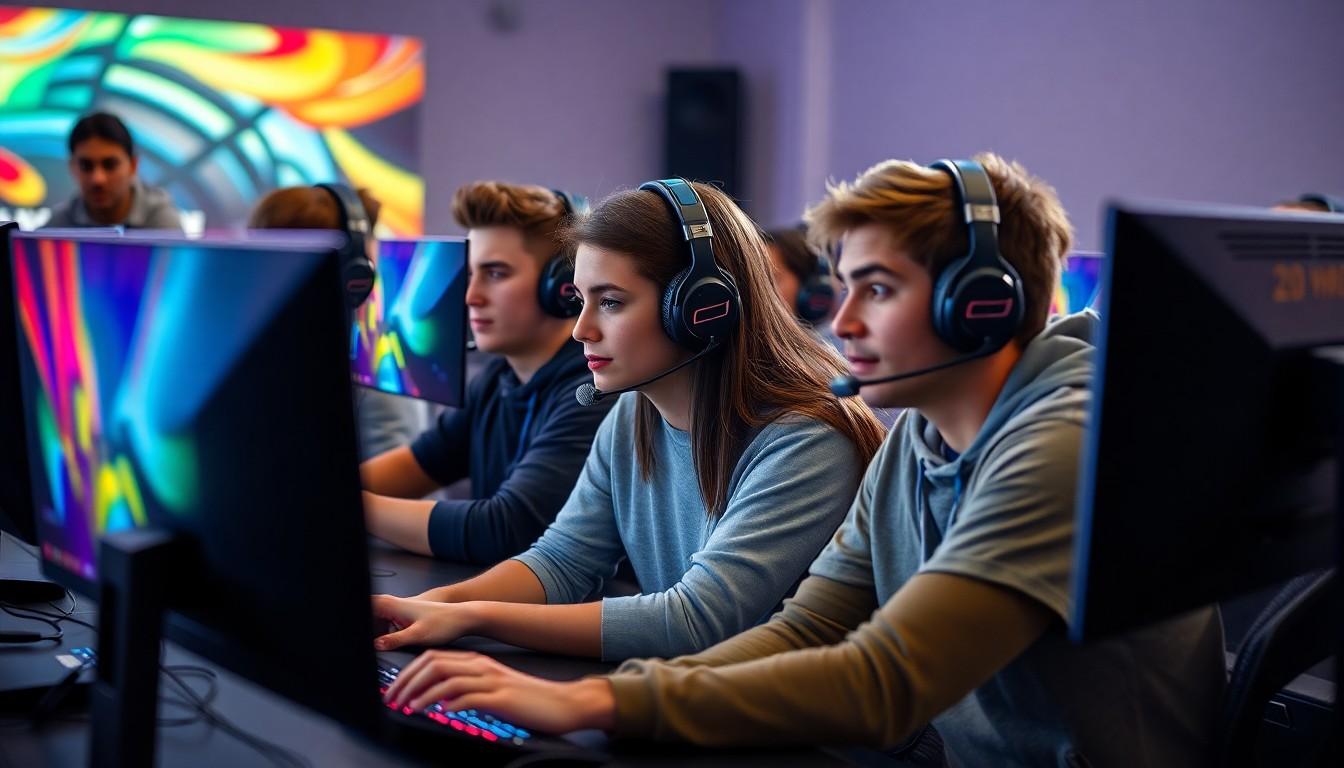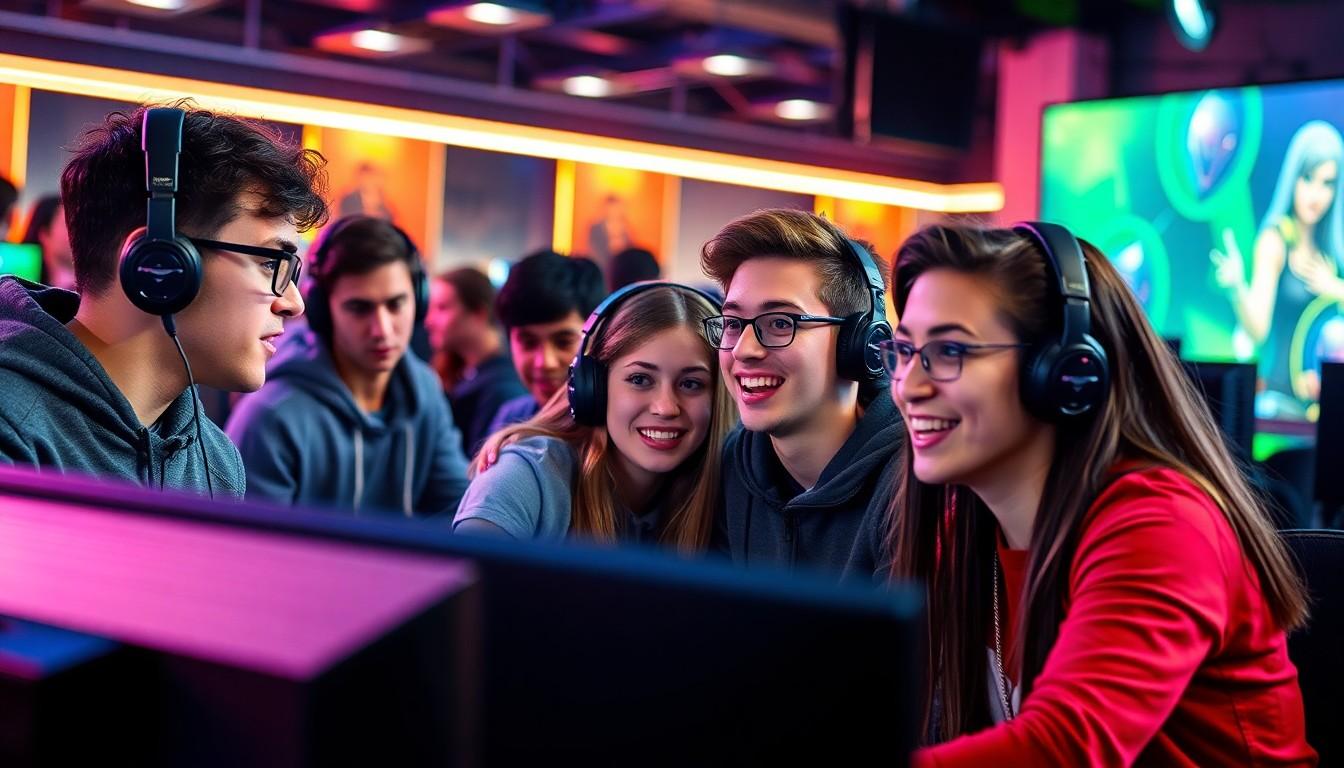In the world of higher education, textbooks and lectures are getting a fierce competitor: college esports teams. These digital gladiators are taking campuses by storm, proving that gaming isn’t just for basement-dwellers anymore. With scholarships on the line and fan bases rivaling traditional sports, it’s time to reconsider the role of gaming in academia.
College Esports Teams
College esports teams are gaining traction in higher education, reflecting a shift in how academic institutions perceive gaming. Scholarships for esports players have emerged, similar to traditional athletic scholarships, allowing students to pursue their passions while receiving financial support. Engagement in these teams fosters community on campuses, often attracting diverse student populations.
Esports competitions occur at local, national, and even international levels, with colleges hosting tournaments and participating in leagues. These events draw significant crowds, showing that fan engagement with esports mirrors traditional sports. Many universities invest in dedicated facilities for their teams, enhancing the student experience and promoting a culture of teamwork.
Collaboration is pivotal; colleges often partner with gaming organizations and developers to enrich their programs. Training regimens resemble those of traditional athletes, focusing on strategy, teamwork, and mental resilience. Faculty involvement also plays a crucial role, with professors providing mentorship and integrating esports into academic curricula.
Success stories continue to emerge, as titles like League of Legends and Overwatch dominate various college competitions. Participation in esports teaches students valuable skills, including communication, leadership, and critical thinking. College esports teams represent not just a trend but a significant evolution within the educational landscape, reinforcing the legitimacy of gaming in academia.
Benefits Of Joining College Esports Teams

Joining college esports teams offers numerous advantages for students seeking both personal and professional growth. Participants can expect to cultivate essential skills and enhance their social networks.
Skill Development
Skill development stands as a primary benefit of joining college esports teams. Students gain expertise in strategy, communication, leadership, and analytical thinking. These skills are crucial in both gaming and real-world applications. Players often engage in tactical discussions, sharpening their ability to plan ahead and make quick decisions. Additionally, commitment to training improves focus and discipline. Competitors learn to adapt under pressure, enhancing mental resilience. By participating in competitive environments, students build confidence, preparing them for future challenges in various fields.
Social Interaction
Social interaction thrives within college esports teams. Participants bond over shared interests, forming friendships that extend beyond gaming. Teams foster a sense of community and belonging among diverse student populations. In tournaments, students collaborate effectively, enhancing teamwork abilities. Camaraderie develops, creating strong support systems during high-pressure situations. Networking opportunities arise through engagement with peers and industry professionals, opening doors for future career paths. Connections made in this environment can lead to collaborations and internships, enriching the student experience and increasing employability.
Popular Colleges With Esports Teams
Numerous colleges have established robust esports programs, attracting students from diverse backgrounds. These institutions recognize the potential of esports as both a competitive and educational platform.
Notable Programs
Many universities stand out for their strong esports initiatives. University of California, Irvine leads with a dedicated esports arena and robust scholarship offerings. Arizona State University excels by providing extensive resources and support for student-athletes. Maryville University in Missouri has built a competitive reputation in games like League of Legends and Overwatch. Similarly, Harrisburg University has gained recognition, thanks to its strategic partnerships and impressive tournament performances. These programs illustrate how institutions foster talent while enhancing the overall college experience.
Competitive Rankings
Colleges compete fiercely in esports, driving interest and participation. According to the 2023 Collegiate Esports Association rankings, University of California, Irvine ranks highest in North America for its consistent performance and championship wins. Other notable mentions include Harrisburg University and Maryville University, both of which have participated in key tournaments and league competitions. Such rankings reflect not just competitive success, but also commitment to player development and academic integration. These standings highlight the ongoing growth and influence of collegiate esports within the larger gaming community.
Challenges Faced By College Esports Teams
College esports teams encounter various challenges that can impact their growth and success.
Funding Issues
Funding presents a significant hurdle for many college esports teams. Institutions often struggle to allocate proper budgets for esports programs, competing with traditional sports and academic departments. Limited financial resources restrict access to high-quality equipment, facilities, and training opportunities essential for team development. Scholarships exist, but they may not cover all costs associated with participation. Furthermore, sponsorships from gaming companies can be inconsistent, making financial stability difficult. Managing expenses while striving for competitive success in a growing field becomes increasingly complex for these teams.
Balancing Academics And Gaming
Balancing academic responsibilities and gaming commitments poses a considerable challenge for student-athletes. Many players face time management issues as they juggle coursework with rigorous training schedules and competition preparations. Stress levels can rise when maintaining academic performance while participating in esports. Schools increasingly recognize the need for support systems, helping students prioritize their studies without sacrificing their passion for gaming. Developing effective strategies for balancing these obligations becomes essential for fostering a healthy student experience.
Future Of College Esports Teams
The future of college esports teams looks promising, driven by expanding opportunities and dynamic competitions. Educational institutions increasingly acknowledge the benefits of integrating esports into their frameworks.
Growth Opportunities
Colleges can bolster their esports programs through scholarships, attracting diverse student populations. Investing in state-of-the-art facilities enhances training experiences and establishes dedicated spaces for practice. Collaboration with gaming organizations not only enriches the curriculum but also opens avenues for sponsorship, thus increasing funding. Networking events enable students to connect with industry leaders, providing practical insights and potential job opportunities. Successful examples, like the University of California, Irvine, demonstrate the potential growth trajectory in attracting skilled players and expanding fan engagement.
Evolving Competitions
Esports competitions continue to evolve, encompassing a wider range of formats, including online and in-person events. Universities frequently host tournaments, encouraging participation from teams nationwide. Enhanced broadcasting technologies elevate the spectator experience, drawing in fans similar to traditional sports spectators. New game titles also emerge while existing ones maintain popularity, creating more competitive opportunities. Institutions that adapt to these changes position themselves favorably in the collegiate esports landscape, nurturing student engagement and fostering a vibrant gaming community.
Paving the Way
The rise of college esports teams marks a transformative shift in higher education. As institutions embrace gaming’s potential, students benefit from scholarships and community building. The skills gained through esports participation extend beyond the virtual arena, fostering essential attributes like leadership and teamwork.
While challenges such as funding and time management persist, the future looks bright for collegiate esports. With continued investment in facilities and partnerships with gaming organizations, schools can enhance their programs and attract a diverse student body. This evolution not only legitimizes gaming within academia but also cultivates a thriving environment for aspiring professionals. College esports teams are paving the way for a new generation of students ready to excel in both gaming and their future careers.

